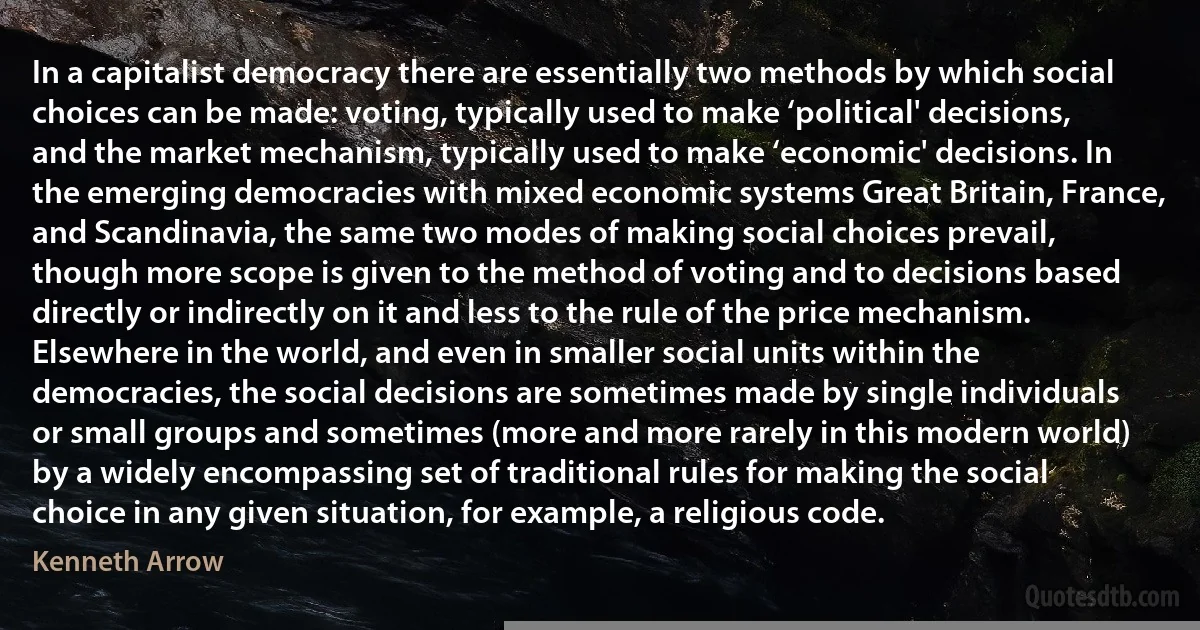
In a capitalist democracy there are essentially two methods by which social choices can be made: voting, typically used to make ‘political' decisions, and the market mechanism, typically used to make ‘economic' decisions. In the emerging democracies with mixed economic systems Great Britain, France, and Scandinavia, the same two modes of making social choices prevail, though more scope is given to the method of voting and to decisions based directly or indirectly on it and less to the rule of the price mechanism. Elsewhere in the world, and even in smaller social units within the democracies, the social decisions are sometimes made by single individuals or small groups and sometimes (more and more rarely in this modern world) by a widely encompassing set of traditional rules for making the social choice in any given situation, for example, a religious code.
Kenneth ArrowRelated topics
capitalist choice code elsewhere emerging example given great less making market mechanism price rule set single situation small traditional voting world britain rules scandinaviaRelated quotes
While Islamophobia like anti-Semitism is centuries old, it too will not be eradicated easily or soon. Therefore we all have a critical role to play: Government policy makers, educational institutions and the media, religious and political leaders, educators, media people, believers and unbelievers, the private and public sectors and international organisations like the UN are charged today to address and promote inter-religious and inter-cultural dialog to build a world based upon a modern notion of tolerance, that is grounded in mutual understanding and respect for others. For the end of the day Islamophobia, anti-Semitism and other forms of intolerance know no religious, racial, tribal or national bounderies or limits. The message at the end of the day is simple and clear: Islam is not the enemy, religious extremism is.

John Esposito
The Labour party believes in the traditional values of society-in the idea that we have responsibilities one to another and that we are not just greedy all the time, looking out only for ourselves. Without being personal, the philosophy that has been propagated over the past 10 years has been wicked and evil...to set man against man, woman against woman and country against country and to build on nationalism and racism...and all the damage that has been done by the Conservatives has been disgraceful...I have a measure called the Margaret Thatcher (Global Repeal) Bill...It would be easy to reverse the policies and replace the personalities-the process has begun-but the rotten values that have been propagated from the platform of political power in Britain during the past 10 years will be an infection-a virulent strain of right-wing capitalist thinking which it will take time to overcome.

Tony Benn
When one looks at Ayatollah Khomeini's vision of an Islamic Government, one realizes that it actually had little to do with the traditional thinking of the Shi'ite establishment. I say this in the sense that his concept of the "Velayate Faghih” (Guardianship of the Islamic Jurists) has in effect violated at least two of the most cardinal principles of the Shi'ite faith. The first being that, the only time divine rule could be envisaged to have domain over us on Earth is upon the reappearance of the 12th Imam, who is considered a "Ma'soum” (or non-sinner). Until then, it is not the role of the clerics to govern society in the name of religion. The second being the principle of "Takassore Maraje'”, or the plurality of sources of emulation, in other words multiple high ranking clerical leaders, as opposed to a single source such as the Pope in Catholicism.

Reza Pahlavi
Economists, like everyone, have their political biases, but these are by no means as strong an influence on what they are willing to consider as you might think. For example, one might have thought that strongly liberal economists like, say, James Tobin would be at least mildly sympathetic to the views of radical economists who draw their inspiration from Marx, or of heterodox economic thinkers like Galbraith. After all, in such fields as history and sociology the Marxist or post-Marxist left has long received a respectful hearing. And yet you don't find this happening: liberal economists are almost as quick as their conservative colleagues to condemn heterodox leftist ideas as foolish it was the liberal Robert Solow, not Milton Friedman, who defended orthodoxy in the bitter "capital controversy" with British radicals.

Paul Krugman
It is great comedy to hear the secular, pro-gay left, so hostile to states' rights in virtually every instance, suddenly discover the tyranny of centralized government. The newly minted protectors of local rule find themselves demanding: "Why should Washington dictate marriage standards for Massachusetts and California? Let the people of those states decide for themselves.” This is precisely the argument conservatives and libertarians have been making for decades! Why should Washington dictate education, abortion, environment, and labor rules to the states? The American people hold widely diverse views on virtually all political matters, and the Founders wanted the various state governments to most accurately reflect those views. This is the significance of the 10th Amendment, which the left in particular has abused for decades.

Ron Paul
